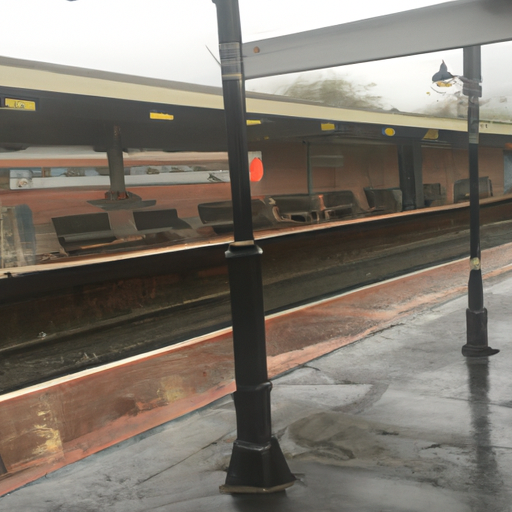three hours agoAbout. sharingJenna Blackburn holding her practice ticketBy Katy AustinTransport correspondent
Vet Jenna Blackburn’s traditional commute is Chester to Manchester, changing at Warrington, usually on Northern
But. she frequently will get stuck in Warrington when trains are delayed or cancelled and has to get a taxi home
“Financially. it’s a lot,” she said. “You’re coming to work to make cash and you can spend extra than your day’s wage to get home”
She. is one of many facing disruption, with practice cancellations at the highest degree since records all started in 2015
Newly. launched data from the Office of Road and Rail shows 38%. of trains in Great Britain have been cancelled in the yr up to 12 November – or one in each 26
“On. a semi-regular basis I’m getting home at nine o’clock at night,” Ms Blackburn said
She. doesn’t drive and said a taxi home from Warrington to Chester in most cases bills between £30 and £40, based on the time. But on strike days taxi prices are larger. Ms Blackburn said she once paid extra than £160 for a taxi when she wanted to get to and from work urgently
“Emotionally. it’s exhausting, to continuously have to look at the practice times each single day. And hope I’m not going to be stranded,” she said
‘Stress. and expense’
When trains are running, Ms Blackburn said they are usually crowded and strikes have added additional stress and expense.
The persistent disruption in latest months has prompted outcry from commuters, leisure travellers, politicians and enterprise groups, especially in the North of England
The. Transport Secretary Mark Harper is due to meet a group of mayors in the quarter on Wednesday to talk about the situation
Cancellations. range throughout the country
Avanti. West Coast, which operates trains between London and Birmingham, Manchester, North Wales and Scotland, had the highest proportion of cancellations, at 8%
Second. highest was Govia Thameslink Railway – which runs Southern, Thameslink, Great Northern and Gatwick Express – at 65%.
Third was TransPennine Express, with 58%. of trains cancelled
These. figures reflect on-the-day cancellations.
They won’t contain deliberate strike timetables, or the record of advance cancellations TransPennine Express releases on a day-by-day basis
In. total, 520,853 companies have been scheduled throughout Great Britain between sixteen October and 12 November, 15% decrease than the similar time in 2019
Passenger. numbers are presently solely around 80% of pre-Covid levels – though they have been larger at some points recently
Avanti. has come in for unique criticism for extreme disruption in July, and then slashing its timetable in August. It said the leading cause was drivers immediately stopped volunteering to work on their relaxation days.
In October, Avanti’s contract was extended for solely six months. The government said it should “drastically improve”
The. practice operator has apologised for the “enormous amount of frustration and inconvenience”. It is nonetheless rebuilding companies as extra drivers are educated up, and says it’s concentrated on restoring a full timetable in December
TransPennine. has additionally come beneath the highlight for poor services, though it insists cancellation numbers have been reducing
What’s. the problem?
Author and railway analyst Christian Wolmar said the railways have been in the “worst state” he had seen in 25 years of writing about them
Earlier. this month I spoke to Steve Montgomery, the boss of First Rail; parent of the two TransPennine Express and Avanti.
He apologised for performance not being good enough, and insisted the operators do employ enough practice drivers; a thing their union Aslef disputes.
Mr Montgomery’s explanation was that Covid directly caused a backlog of driver training, which can take up to 18 months, and staff sickness levels are high.
Added to this, reliance on drivers agreeing to work on days off – which has been widespread in the industry for a long time – has left some operators exposed during a interval of strained industrial relations
Transpennine. hasn’t had a relaxation day working contract in place with Aslef for virtually a yr. It says this means much less flexibility. But it says extra drivers are, steadily, qualifying
Avanti. is aiming to restore a full timetable in mid December – without relying on overtime
Angie. Doll, chief working officer of GTR, said performance over the past yr had been affected by the impact of Covid, short-term sickness, extreme weather and increasing trespass incidents
She. said the operator had a plan in place to make improvements, and was working with Network Rail to increase reliability. GTR additionally noted issues at other practice corporations could have a knock-on effect
In. a statement Tricia Williams, chief working officer of Northern, apologised for disruption, putting it down to components “including fully-trained driver availability and the on-going industrial relations issues with the commerce unions”
These. aren’t the solely operators with staff problems. On Sunday, practice drivers in Aslef stopped working overtime at LNER, after a latest vote
Infrastructure. problems play a role too. ORR recently said Network Rail, which oversees tracks, energy strains and signals, wanted to do extra to supply greater performance
But. Mr Wolmar said he believed there was extra to the latest problems, with a “perfect storm” of factors
“Some. of it is actually downright poor management,” he said. “And that opinion comes not just from me as a railway watcher however from a lot of the senior railway individuals I talk to”
During. the Covid crisis, the government moved practice corporations onto emergency contracts.
Now, most practice operators are paid on a performance-related fastened price basis, and it is the government, that bears the monetary probability – and holds the purse strings
Mr. Wolmar believes these contracts have resulted in much less effort from managers to run a good service, and high sickness levels among staff who have gone over two years without a pay rise, are “really an expression of worker dissatisfaction”
The. Rail Delivery Group (RDG), which represents practice companies, said: “We completely reject any suggestion that the alternative of franchises with contracts during the pandemic is adversely affecting performance”
It. added that while it was true that the Department for Transport now pays practice operators a price to run practice services, that payment was performance-related.
The RDG said the pandemic has had a long-term impact on companies by reducing the number of drivers and other staff who could be educated as well as increasing staff absences.
It acknowledged that the nationwide dispute involving three rail unions had caused extreme disruption and on cancellations it said “the industry is working onerous to cope with an unprecedented convergence of issues”
Meanwhile,. the future of how the railway is run is now uncertain, after the creation of a new umbrella body known as “Great British Railways”, was delayed
Train. corporations are making ready to introduce a new timetable on eleven December – though RMT strikes are deliberate in its first week. Passengers will be hoping this change ushers in extra reliability
More. on this story
21 November



